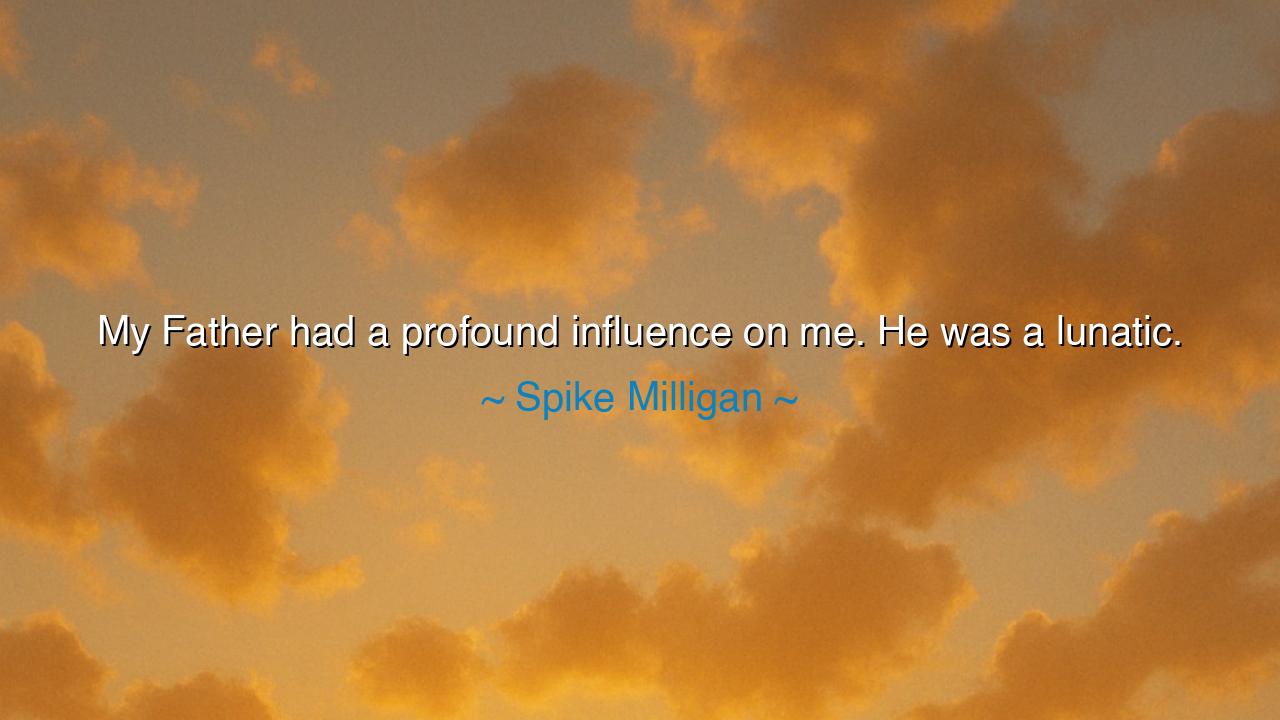
My Father had a profound influence on me. He was a lunatic.






“My Father had a profound influence on me. He was a lunatic.” — so declared Spike Milligan, the jester-philosopher of the modern age, whose laughter veiled great sorrow, and whose madness was wisdom wrapped in jest. In these words lies a paradox both tender and true: that influence does not always come from calm reason or measured order, but from the wildness of spirit—the lunacy that dares to dream, to rebel, to see the world askew. For often it is the so-called mad who awaken the sleeping, who tear away the veils of dull conformity and reveal the deeper pulse of life itself.
In the days of our ancestors, the madman was both feared and revered. The Greeks spoke of “divine madness”—a frenzy sent by the gods that freed the mind from the chains of habit. The poet, the prophet, the seer—all were touched by this sacred flame. And so Milligan, in jest, speaks an ancient truth: that from the lunatic—the one unbound by the world’s polite order—there flows a kind of higher inspiration. His father’s influence, though wrapped in chaos, was profound not despite his madness, but because of it. Through his father’s eccentricity, the son learned to see life’s absurdity not as a curse, but as a cosmic comedy.
For in every family, the parent is the first mirror of the world. Some children inherit discipline, others sorrow—but the luckiest inherit imagination. Milligan’s father, though called a lunatic, must have seen the universe through colors unseen by ordinary eyes. He might have spoken to birds, laughed at ghosts, or wept at sunsets—yet in doing so, he taught his son that truth hides behind laughter, and sanity is not always wisdom. The world needs such figures—the holy fools who, by their very strangeness, remind us that to live fully, one must risk appearing mad.
Consider the tale of Nikola Tesla, the lightning-born inventor, whose brilliance bordered on lunacy. He spoke to pigeons, slept two hours a night, and dreamed of harnessing energy from the heavens. To many, he was mad; yet his madness lit the modern age. The currents of his imagination now hum in every city, every home, every flicker of electric light. Such is the paradox of influence—that from the minds that seem broken, creation often pours most freely.
But beware, dear listener, for not all madness is holy. There is the lunacy born of ego and cruelty, which destroys rather than creates. The lesson of Milligan’s words lies in discernment: to embrace the madness that liberates, not the one that enslaves. His father’s chaos gave him wings, not chains; it taught him to find humor in pain, and to transform despair into art. This is the madness the world needs—the laughter that heals, the rebellion that enlightens, the wildness that gives birth to meaning.
Thus, when you encounter a lunatic, pause before you judge. For beneath the chaos may lie the seed of genius, the spark of divine insight. And if within yourself you feel that same madness—the urge to dance when others march, to dream when others sleep—do not extinguish it. Tend it, like a secret flame. For every prophet, every poet, every innovator has carried within them a touch of beautiful insanity. It is the mark of those who dare to see the world not as it is, but as it could be.
The teaching is this: influence is not found in perfection, but in authenticity. A parent, a teacher, a friend need not be flawless to shape a life—they need only be alive with truth. Let your own spirit, however strange, be that beacon for others. Do not fear your lunacy, your laughter, your contradictions. Channel them into creation, into compassion, into light. For it is better to be mad with meaning than sane with emptiness.
And so, remember the words of Spike Milligan—not as mockery, but as revelation. The world is built by the lunatics, inspired by their visions, redeemed by their laughter. Let the flame of your own madness burn bright, but let it warm, not scorch. For in the end, it is not reason that saves us—it is the wild love of life, the audacity to laugh in the face of sorrow, and the courage to be joyfully, gloriously human.






AAdministratorAdministrator
Welcome, honored guests. Please leave a comment, we will respond soon